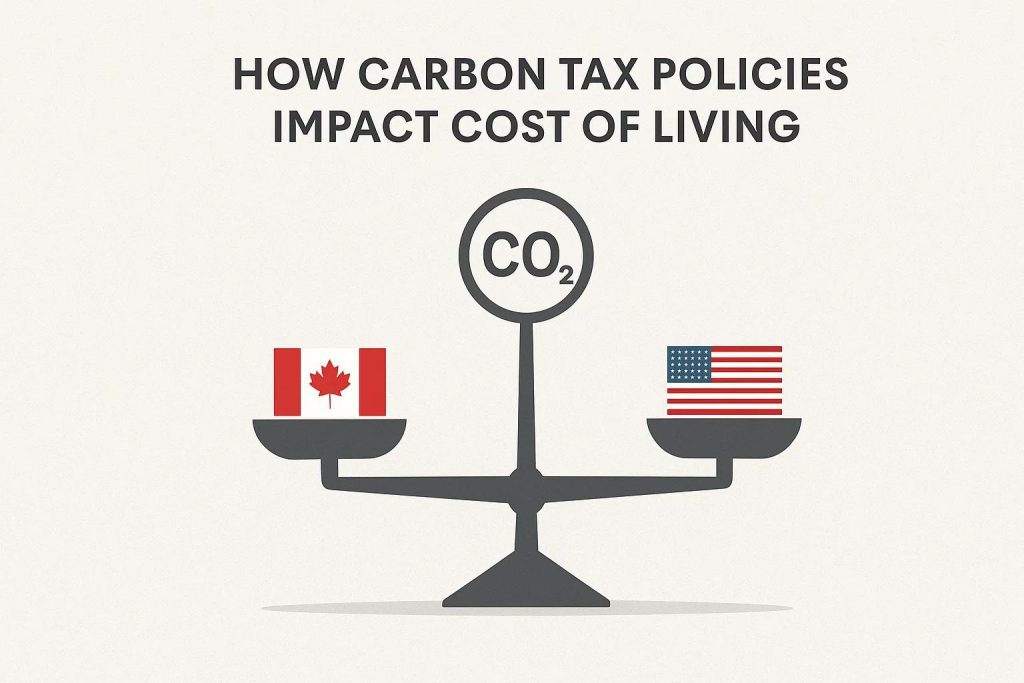The introduction of carbon tax policies has sparked heated debates regarding their effects on household expenses. In both Canada and the US, these measures aim to reduce greenhouse gas emissions by encouraging the use of cleaner energy sources. However, understanding how these policies influence everyday finances is crucial for citizens and policymakers alike.
As governments seek ways to combat climate change, carbon taxes have emerged as a significant tool. These taxes impose a fee on fossil fuels, aiming to incentivize businesses and individuals to reduce their carbon footprint. Although an essential step towards sustainability, questions remain about the real impact on the cost of living, especially for lower-income families who may bear a disproportionate share of these costs.
Understanding carbon tax policies

Carbon tax policies are designed to shift behavior by making carbon-intensive goods and services more expensive. By assigning a cost to the emission of carbon dioxide, these taxes encourage both companies and individuals to opt for cleaner alternatives. The primary goal is to reduce carbon emissions and slow down global warming.
In Canada, carbon pricing is a core element of the country’s environmental strategy. The federal government has implemented a nationwide carbon tax, prompting provinces to either adopt this measure or develop their own. Meanwhile, the US approach has been more fragmented, with some states adopting their own carbon pricing initiatives.
How carbon taxes affect citizens
For Canadian and American households, carbon taxes can lead to higher utility bills and fuel costs, as businesses pass on the added expenses to shoppers. Energy-intensive goods, such as transportation and heating, may see the most significant price hikes. While some argue that these costs are necessary to combat climate change, others worry about their regressive nature, disproportionately affecting those with lower incomes.
To mitigate these effects, some governments have introduced rebates or tax credits to offset the burden on households. These measures aim to return a portion of the tax revenue to citizens, helping alleviate financial pressures. However, the efficacy of these rebates in counteracting increased living costs remains a topic of debate.
Implications for economic growth and sustainability
Carbon tax policies have broad implications for economic growth and sustainability. On one hand, they encourage the development of clean energy industries, potentially creating new jobs and driving innovation. By making fossil fuels more expensive, these measures also push companies to invest in energy-efficient technologies.
However, there are concerns about the competitiveness of industries exposed to global markets. As production costs rise due to carbon taxes, businesses may struggle to maintain their edge against foreign competitors not subject to similar taxes. This situation underscores the importance of collaborative international efforts to implement consistent climate policy frameworks.
Practical strategies for adaptation
Individuals and businesses must adopt practical strategies to cope with the changes brought by carbon taxes. For consumers, reducing energy consumption through efficiency upgrades and lifestyle changes can help manage costs. Investing in renewable energy sources, such as solar panels, may provide long-term savings and reduce dependency on fossil fuels.
Governments can support these efforts by offering incentives for clean energy investments and fostering innovation through research grants and subsidies. Implementing educational initiatives to raise awareness about the benefits of reducing carbon footprints can also play a crucial role in facilitating this transition.
Conclusion
In conclusion, while carbon tax policies are essential tools for combating climate change, they also have significant implications for living costs in Canada and the US. By understanding these impacts, we can better navigate the complexities of implementing such measures.
Balancing environmental goals with economic stability requires carefully crafted strategies that consider the needs of all stakeholders. Through cooperation and forward-thinking approaches, we can work towards a more sustainable future without compromising economic well-being.
